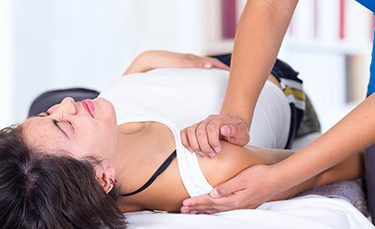common medical emergencies

If your travels are primarily to urban areas in developed countries, you may not need to self-treat anything more complex than a hangnail or a headache. If your travels take you to wilderness settings, remote rural areas or developing countries — out of easy reach of definitive medical care — consider bringing with you a practical book about common medical problems and emergencies. For a list of reliable travel medical guides, see Resources in Section 1.
The following are a few issues that may arise when you are traveling.
Abdominal or Pelvic Pain
Pain in the abdomen or pelvis may be a simple stomachache, or it can indicate a significant underlying problem — especially if it is associated with prolonged pain, hypotension (low blood pressure), fever, rigidity of the abdominal wall or bleeding within the gastrointestinal system. Among the diagnoses to consider are a ruptured bowel, diverticulitis (an inflammation within the intestine or colon), appendicitis, kidney stones, ulcers or a bowel obstruction. Evacuation to a medical facility may be necessary to diagnose and treat the underlying condition.
If there will be a considerable delay in arranging for evacuation, it is important to pay close attention to the patient’s hydration status. It might be necessary to administer a course of antibiotics.
Dislocated Joint
Dislocation of a large joint, such as a shoulder, hip or jaw, can be caused by a variety of trauma as well as relatively minor forces. A dislocation can cause intense pain, swelling, bruising, numbness and instability of the affected joint. In cases of an apparent dislocation, it is essential to check for neurovascular compromise — to see if the dislocated joint has pinched a nerve or blood vessel.
There are several effective methods for relocating joints, depending on which joint is affected; adventure enthusiasts should become familiar with them. A successful relocation is usually possible in the field and typically results in pain relief and even improved neurovascular symptoms.
Gastrointestinal Bleeding
Gastrointestinal (GI) bleeding is a relatively common, potentially life-threating disease with an overall mortality rate of up to 10 percent.65,66,67 It is usually classified as either upper GI bleeding — which tends to originate in the esophagus, stomach or first part of the intestines — or lower GI bleeding — which usually originates in the distal small intestines or colon or from brisk bleeding in the upper GI tract.
The most common causes of upper GI bleeding include gastritis, peptic ulcers, esophageal tears from vomiting, varices and abnormal blood vessels. Lower GI bleeds can be from hemorrhoids, diverticulosis, tumors, abnormal blood vessels and brisk bleeding in the upper GI tract.
The most common symptoms of upper GI bleeding include chest or abdominal pain, vomiting blood, weakness, shortness of breath, nausea, dark tarry stools and red blood in the stool. Doctors can typically diagnose an upper GI bleed based on the person’s medical history and a physical examination, laboratory testing and an upper endoscopy (a camera placed into the stomach through the mouth).
Symptoms of lower GI bleeding include dark, red blood in the stools, abdominal pain, rectal pain or bleeding, change in bowel patterns, nausea, weakness and malaise. Severe bleeding may lead to shock. Doctors can typically diagnose a lower GI bleed through a physical examination, laboratory testing, CT scans and an endoscopy (a camera placed into the rectum to determine the source of bleeding). Patients with severe bleeding may need both an upper and lower endoscopy or tagged red blood cell scans to determine the source of the bleeding.
Treatment is based on the cause of the bleeding. All patients with significant bleeding will need a full evaluation to determine the severity of bleeding and to treat any reversible causes. Significant bleeding requires resuscitation with intravenous fluids and possible blood products depending on severity. People who take blood thinners would require reversal of anticoagulation. Most patients with significant bleeding will need to be admitted to the hospital to find and treat the source.
To help prevent GI bleeds, continue taking any prescribed antacids, proton-pump inhibitors (PPIs) and antihistamines, and avoid consuming alcohol and tobacco. While there is no definitive data to determine which type of diet is best for patients who are prone to GI bleeding, it may be best to avoid foods that cause upset stomach.
Headache
Everyone is likely to have a headache at some time. Headaches may be relatively mild and transient or crushing and long-lasting. They are a very vague manifestation and can be caused by a wide array of conditions or situations ranging from psychological stress or mild dehydration to migraine, a stroke or a brain tumor. The most common causes of headaches in travelers are stress, fatigue and dehydration. Other possibilities to consider are caffeine withdrawal, sinus abnormalities and carbon dioxide retention (especially in divers). Headache can also be associated with decompression illness, but it is usually not the leading symptom, and it is not enough alone to consider DCI.
Symptoms that may indicate a serious underlying condition include accompanying neurological abnormalities and continuous vomiting. A stiff neck and a fever accompanying a headache can signal meningitis. A severe, sudden-onset headache — often described as “the worst headache of my life” — can signal intracranial bleeding (bleeding in the brain). A headache that increases slowly over time with neurological symptoms can indicate an intracranial mass (brain tumor).
For information about conducting a field neurological examination, see Neurological Assessments later in this section.
Heart Attack
A heart attack, also known as a myocardial infarction (MI), is an interruption in blood flow to the heart and is usually caused by a clot lodging in the coronary arteries, which supply the heart with blood. The most common symptoms of a heart attack are chest pain or discomfort, shortness of breath and discomfort radiating to the arms, back, neck, jaw or other parts of the upper body. Other symptoms can include nausea, dizziness and a cold sweat. Women may experience different symptoms — often vaguer and/or milder.
An MI should be suspected in anyone who experiences such symptoms, especially people who have risk factors such as hypertension (high blood pressure), hyperlipidemia (high cholesterol), obesity, diabetes, a personal or family history of MI or a history of smoking. Individuals with any of those risk factors should get a thorough cardiac evaluation before traveling because access to good, timely care is difficult or impossible in some locations.
When an MI is suspected, especially in people experiencing shortness of breath, immediate medical evaluation at the closest medical facility could be lifesaving. If available, consider administering supplemental oxygen; if the person is not allergic to aspirin and hasn’t been told they shouldn’t take it, one could offer them 324 milligrams of aspirin. Cardiac patients who have been prescribed nitroglycerin to treat angina (chest pain caused by a reduction in the flow of blood to the heart) can consider taking one or more doses of that drug as needed. Patients who have been prescribed an anticoagulant (a drug that reduces the blood’s tendency to clot) or a beta blocker (a class of drugs used to treat angina, high blood pressure and heart rhythm disturbances) should take such medications if they haven’t already done so.
Place any such patients in a comfortable, supine position (flat on their back, face up), with their head elevated if congestive heart failure is a concern. Then plan to evacuate the patient to the nearest medical treatment facility.
Stroke
A stroke is an interruption in blood flow to the brain, usually caused by a clot lodging in the cerebrovascular system, and it typically manifests itself through a variety of neurological abnormalities. A stroke’s symptoms can be as mild as subtle changes in mental capability or as marked as paralysis of one side of the body (hemiplegia), blindness or loss of consciousness. For information about conducting a field neurological examination, see Neurological Assessments later in this section.
Prompt evacuation to a medical facility, preferably one with expertise in treating strokes, is essential. The recommended therapy varies depending on the cause of the stroke. If the affected individual did any recent diving, be sure to mention the possibility of decompression illness to all medical personnel.
Toothache
Dental trauma, an infection of the teeth or gums, or an infection of the sinus cavities are possible causes of toothaches. Trauma can result from a direct blow to the mouth as well as from barotrauma due to a differential in pressure between the ambient environment when diving and the gas-filled space in a tooth with a cavity.
A dislodged tooth can often be reimplanted; see instructions at AAE.org/patients/dental-symptoms/knocked-out-teeth. If the cause of a toothache is an infection or abscess, antibiotic treatment may be required. If a toothache is accompanied by swelling and rapidly expanding pain, consider it an emergency since it may result in obstruction of the airway in severe cases.
Urinary Tract Infections
The urinary tract is composed of the kidneys, the ureters, the urinary bladder and the urethra. Urinary tract infections (UTIs) are quite common, affecting 150 million people worldwide each year.68 This condition is usually self-diagnosable, although lab tests and imaging are sometimes required, and definitive treatment involves prescription antibiotic drugs.
UTIs are rare in children and are more common in women than men. Women have much shorter urethras than men, which makes their urinary tracts more susceptible to bacterial infection.
The upper urinary tract consists of the kidneys and ureters, while the lower urinary tract consists of the urinary bladder and the urethra.
Upper UTIs usually affect the kidneys (pyelonephritis is an infection of the kidney itself and the “renal pelvis”), which can cause fever, nausea, vomiting and other severe symptoms.
Lower UTIs involve the bladder (cystitis) and the urethra (urethritis).
Symptoms of UTI usually involve a variable degree of pain in the pelvic area and an increased urge to urinate. Symptoms sometimes involve pain or a burning sensation during urination (dysuria), and there may or may not be dark-colored urine or traces of blood in the urine. It is also quite common for people to feel they cannot empty their bladder after urination. Signs and symptoms of upper UTI may also include lower back pain, cramping, nausea, vomiting and fever.
If a UTI is suspected, it is important to seek medical care and maintain adequate hydration. Prescription antibiotics are necessary to definitively treat a UTI, but maintaining a good flow of urine all through the urinary tract may help to displace some bacteria and prevent the infection from spreading before you can reach a doctor.
UTIs are so common that any medical doctor should be able to diagnose and treat it regardless of their specialty or your location. Treatment typically consists of a course of oral antibiotics, but a neglected UTI may become complicated and require hospitalization if you delay care.
Wounds
Stop bleeding by applying steady, direct pressure to a wound. Once bleeding has slowed or stopped, clean the wound of debris and generously irrigate it — preferably with saline solution or some other sterile liquid, especially if the wound will be closed.
There are a variety of methods for closing wounds, including butterfly bandages (Steri-Strips), topical adhesives, staples and sutures. Some experts recommend loose closure of a wound to allow for drainage in case an infection develops during the healing process. Depending on the circumstances, it is also worth considering a prophylactic (preventive) tetanus booster and antibiotics to forestall infection.
Hand injuries can be particularly serious, because long-term functional impairment can result from some wounds. Injuries near joints, tendons and nerves are also of particular concern and may warrant consultation with a specialist as soon as possible.
Neurological Assessments
If you spend a lot of time in remote areas, you may eventually need to conduct a neurological assessment of a traveling companion. Knowing how to conduct neurological assessments is especially useful for divers because dive-related maladies such as decompression illness can often have neurological manifestations.
The following links are aimed primarily at divers, but much of the information is also relevant to nondiving situations.
Field Neurology for Divers
An article titled “Field Neurology for Divers” published in DAN’s Alert Diver magazine contains detailed advice on conducting a neurological exam in the field. Read the article at DAN.org/alert-diver/article/field-neurology-for-divers.
A video showing how to conduct a neurological assessment is available at youtu.be/NUzwPOeyI74.
Neurological Assessment Course
DAN offers a course in conducting neurological assessments that
divers and other travelers may find useful. For more information, see
DAN.org/education-events/instructor-led-courses.

Pain in the abdomen or pelvis may be a simple stomachache, or it can indicate a significant underlying problem.

There are several effective methods for relocating joints, depending on which joint is affected; adventure enthusiasts should become familiar with them.

Gastrointestinal (GI) bleeding is a relatively common, potentially life-threating disease.

The most common causes of headaches in travelers are stress, fatigue and dehydration.

When an MI is suspected, especially in people experiencing shortness of breath, immediate medical evaluation at the closest medical facility could be lifesaving. If available, consider administering supplemental oxygen; if the person is not allergic to aspirin and hasn’t been told they shouldn’t take it, one could offer them 324 milligrams of aspirin.

Dental trauma can result from a direct blow to the mouth as well as from barotrauma due to a differential in pressure between the ambient environment when diving and the gas-filled space in a tooth with a cavity.

If a UTI is suspected, it is important to seek medical care and maintain adequate hydration. .
DAN Customer Service
Mon–Fri, 8:30 a.m. – 5 p.m. ET
+1 (919) 684-2948
+1 (800) 446-2671
Fax: +1 (919) 490-6630
24/7 Emergency Hotline
In event of a dive accident or injury, call local EMS first, then call DAN.
24/7 Emergency Hotline:
+1 (919) 684-9111
(Collect calls accepted)
DAN must arrange transportation for covered emergency medical evacuation fees to be paid.
Medical Information Line
Get answers to your nonemergency health and diving questions.
Mon–Fri, 8:30 a.m. – 5 p.m. ET
+1 (919) 684-2948, Option 4
Online: Ask A Medic
(Allow 24-48 hours for a response.)